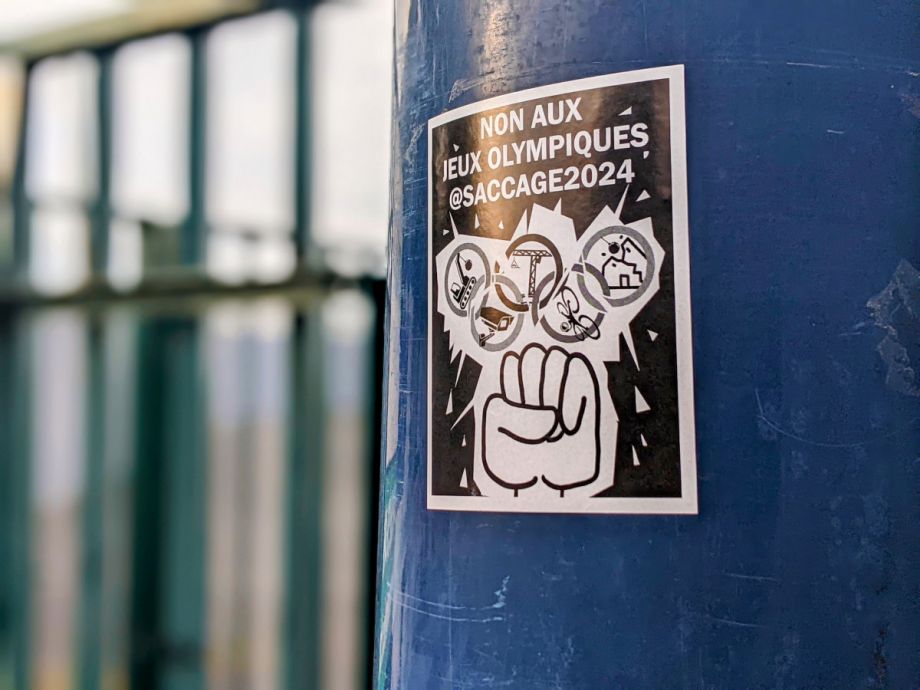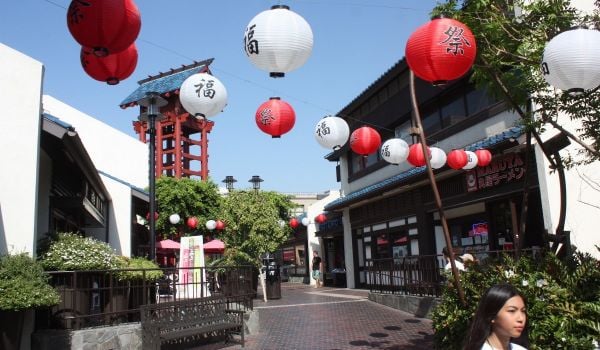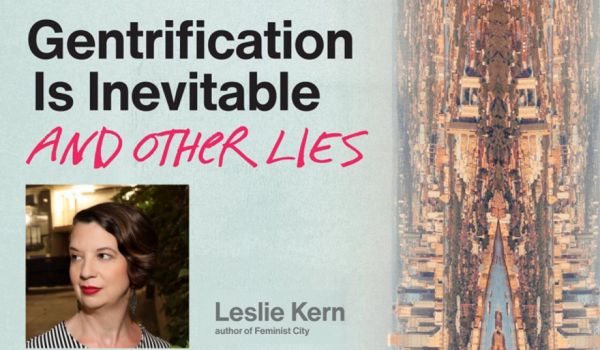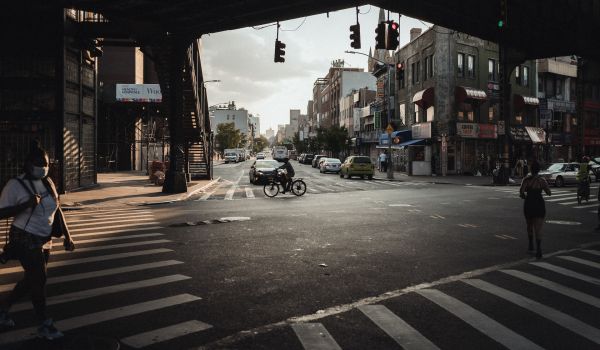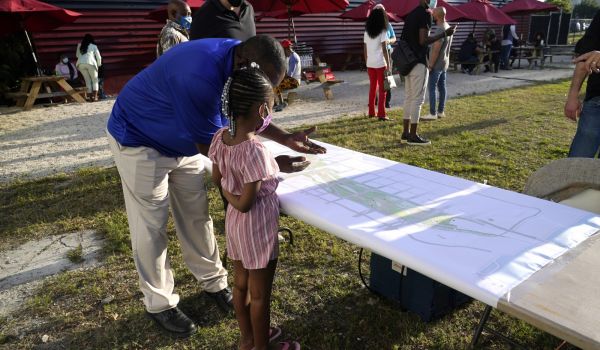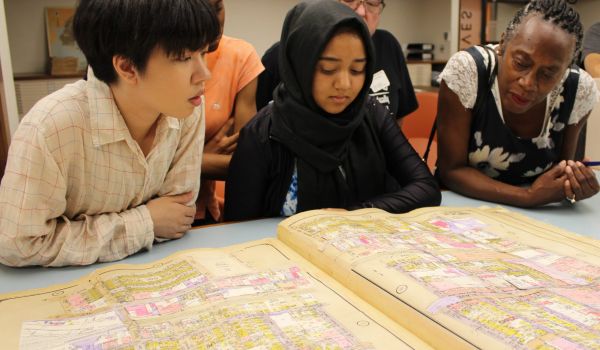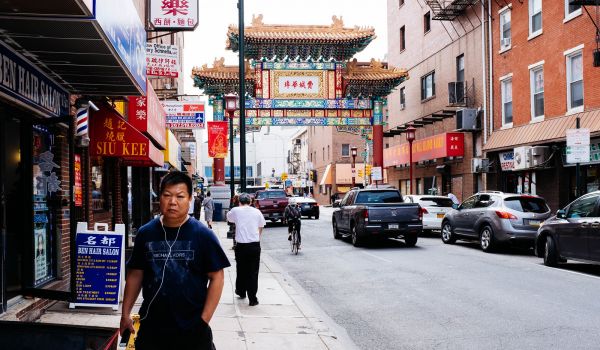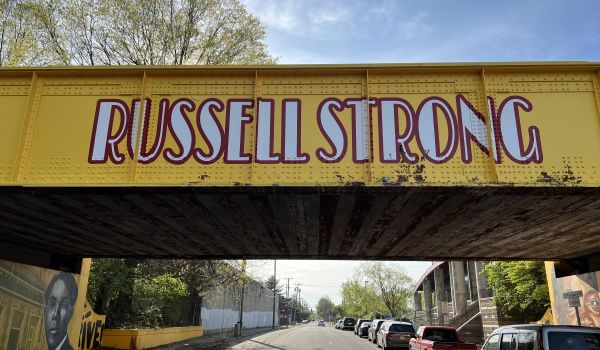The rendez-vous is set for 6:45 p.m. in front of a metro entrance in Saint-Denis, a dense working-class suburb north of Paris. Arthur, who preferred to use a pseudonym for this article, waits for the small group of activists to join him at the bike share station. The activity for the evening: a “toxic tour.”
Wearing wire-framed glasses and a black t-shirt with the words “Fuck the Olympics” written in bold, capital letters, Arthur goes through the evening’s agenda as his fellow activists unlock clunky Vélib’ bike share bikes. Saint-Denis, he explains, will host many of the events of the 2024 Paris Olympic Games. The goal of the “toxic tour,” a 12-kilometer bike loop through Saint-Denis, is to visit the future sites of the Games, check in with residents affected by the construction and monitor the progress of the construction zones.
“The best way to understand the impact [of the Games] is to see them in person,” he says.
On this night in late July, Arthur is joined by three other activists, all members of the collective Saccage 2024 – or Pillage 2024 in English, a reference to the environmental and social damage they say the 2024 Paris Olympics is causing – and two filmmakers working on a documentary about the upcoming games.
Weaving through rush hour traffic, the group makes a stop at the future site of the Media Village before cycling along the highway to the Stade de France, across from which an Olympic-sized pool is being constructed.
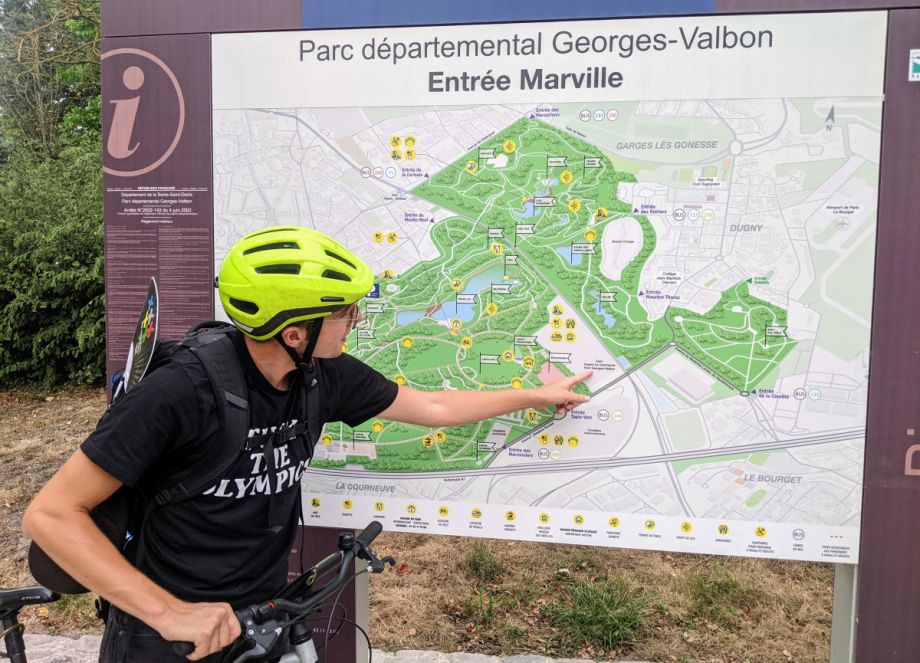
Arthur points out the Toxic Tour route on a map. (Photo by Phineas Rueckert)
As night falls, the group arrives at their second-to-last stop: the Anatole France elementary school, shuttered for the summer vacation. Standing in front of the school, Hamid Ouidir, a member of Anatole France’s parent-teacher alliance, explains his years-long fight against a highway interchange that is being constructed to fluidify traffic for the Games, forming a triangle of five-lane highways around the school. According to Ouidir, who has set up monitors in the school and surrounding neighborhood, the additional traffic due to the interchange could have disastrous consequences for the 600 students at Anatole France – with air and noise pollution levels above World Health Organization standards.
“What’s in it for us? What do we get from all of this?” Ouidir asks. “Pollution. We need trees, not concrete.”
The tour ends at the future Olympic village, a sprawling construction site that Olympic organizers say will be turned into an eco-village after 2024, around 11 p.m. when the remaining activists are asked by plain-clothed security guards to leave the area.
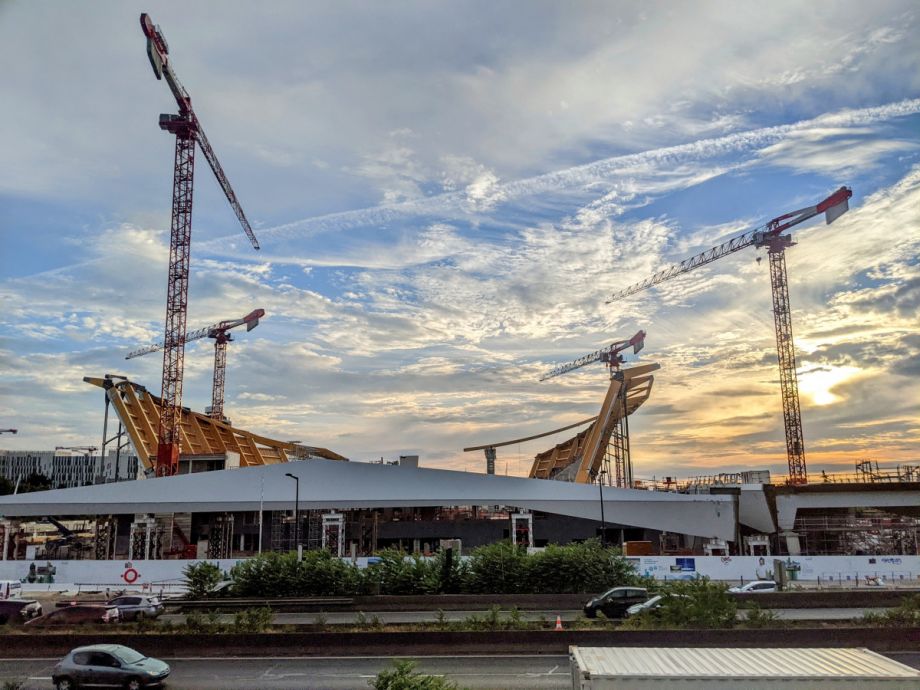
Construction on a new Olympic pool in Saint-Denis. (Photo by Phineas Rueckert)
A global anti-Olympics movement takes root in Paris
An umbrella group comprising environmental activists, affected residents, housing activists, migrants rights organizations, academics and members of other feminist and anti-racist groups, Saccage 2024 is building a unique coalition in the aim of bringing awareness to the environmental and social damage they anticipate the Olympic Games will have on Paris and its surrounding suburbs.
The organization, founded in 2020, has looked for inspiration both locally and from abroad. In May, the group organized an international conference in Paris with anti-Olympics activists and academics from France, Japan, the U.K., the U.S., Germany and Catalonia. The conference included panel discussions, video projections and a toxic tour ending in a protest in the center of Paris.
“Anti-Olympics activists have gone transnational,” says Jules Boykoff, a professor of political science at Pacific University and author of the book “Power Games,” a political history of the Olympics. “The Olympics are this huge juggernaut and a few years ago, activists realized that if they wanted to be truly effective in fighting the Olympics they needed to be transnational in their fight back, as well.”
This international movement includes Natsuko Sasaki, an anti-Olympics campaigner who participated in Saccage 2024’s event in Paris.
“If there’s no resistance in France, then we are leaving a shitty legacy to those who come after us,” Sasaki, who is originally from Japan, says over lunch in Paris.
Sasaki first got involved in anti-Olympics activism in 2016 after hearing about displacement of homeless and low-income residents in Tokyo to make way for Olympics infrastructure. “I knew the same thing was going to happen in France,” she says.
Indeed, activists in Paris fear that construction projects and urban development leading to gentrification will push low-income residents further from the center of Paris. Multiple migrant camps along the periphery of the city have already been cleared to make way for the Olympic Games, according to researcher Manon Vergario.
“The Olympics tend to remake cities in ways that tend to advance the interests of the already rich at the expense of the already marginalized,” Boykoff says. “The biggest negative externality is that life is going to get harder for the already poor or the working class in Paris.”
Helen Lenskyj, a retired professor of sociology at the University of Toronto who has written five books on the Olympics, agrees with this analysis.
“They say that the Olympics [are] a catalyst for urban development. The Olympics put the city on the world map and there [are] investments and then the city [will] prosper and that [will] trickle down to low-income people,” she says. “That really hasn’t eventuated because simplistically the rich get richer and the poor get poorer.”
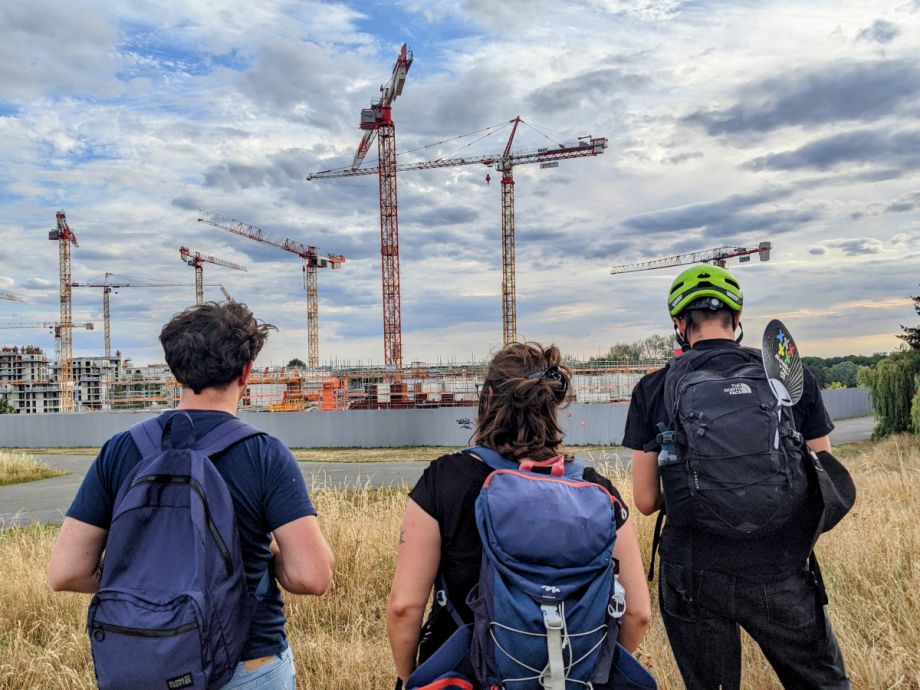
Activists from Saccage 2024 appraise the progress on construction of the future Media Village. (Photo by Phineas Rueckert)
‘Stop it before it happens’
With two years before the Olympics are set to begin, Paris activists admit that the chances the Games will be canceled or postponed are next to none.
Nevertheless, according to Arthur, the fight remains important. “The fight against the Olympics is good because it is multidisciplinary,” he says. “We can talk about ecology, but we can also talk about corruption, sponsorship, working conditions, surveillance, technopolitics, prostitution.”
“We can talk about everything with the Olympics because the Olympics are a wonderful tool of capitalism,” he adds.
The organization and its allies have achieved some notable victories. In Aubervilliers, a suburb just north of Paris, activists at Saccage 2024 and Jardins à Defendre, an ecological activist group, were able to prevent the construction of a solarium on top of a community garden currently used by working-class residents.
Activists used a variety of tactics – physical and otherwise – to obtain a work stoppage, including holding informational community meetings, passing around a petition that garnered more than 100,000 signatures, organizing protests, meeting with elected officials and filing legal cases. In September 2021, eight activists were arrested and held in detention for 34 hours after chaining themselves to the concrete mixing plant being used to fill in the garden lots. In February, Paris’s Administrative Court of Appeals ruled that the destruction of the gardens would “undermine the preservation of a core of primary biodiversity and increase existing ecological discontinuities.”
This type of movement-building remains important even when the main goal is not achievable, according to Julien Cheyne, an anti-Olympics activist in London who runs the website Games Monitor.
“You’ve got to stop [the Olympics] before it happens,” he says. “There is still value in continuing to argue because that will link to new campaigns.”
In Los Angeles, activists are already gearing up to fight back against the 2028 summer games. Some of these activists – part of the group NOlympics LA – attended the meeting in Paris and remain in contact with their French counterparts.
Boykoff, at Pacific University, compared resisting the Olympics to playing a game of Whack-A-Mole. “They roll through your town and people go, ‘Woah, look at all of these problems,’” he says. “It brings together these activists and they try to whack it and then it’s just done, and what they’re trying to do in Paris is to be part of something bigger that moves from city to city.”
Ironically, he notes, the Olympics brings together people from different arenas, who might not otherwise work together, to fight against the Games and their impact. “Those people often become friends, they become comrades, allies, and then after the Olympics they continue to fight in their city for justice,” he adds.
An earlier version of this story incorrectly said Lenskyj was a professor of political science; in fact, she taught sociology. We regret the error.

